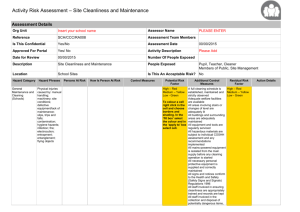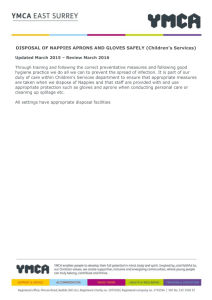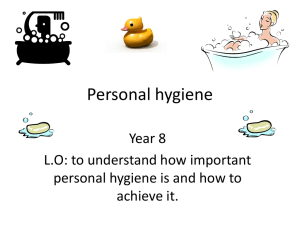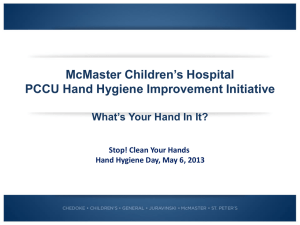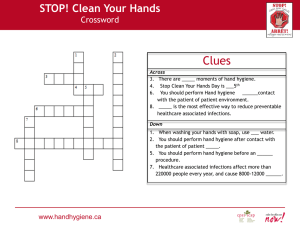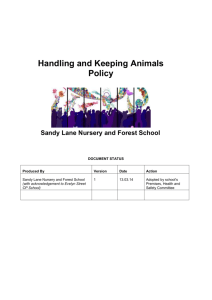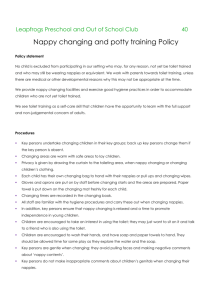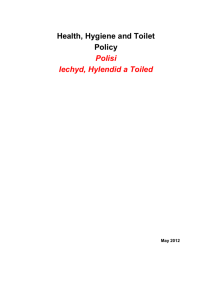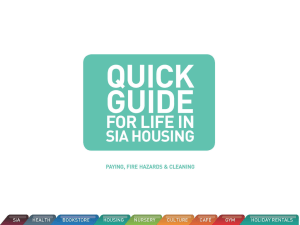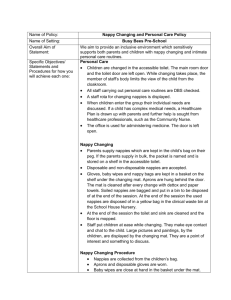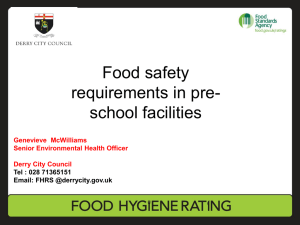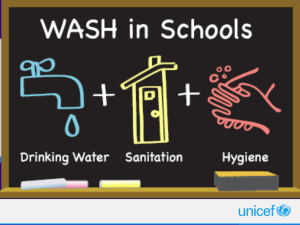Tenby Junior Community School
advertisement
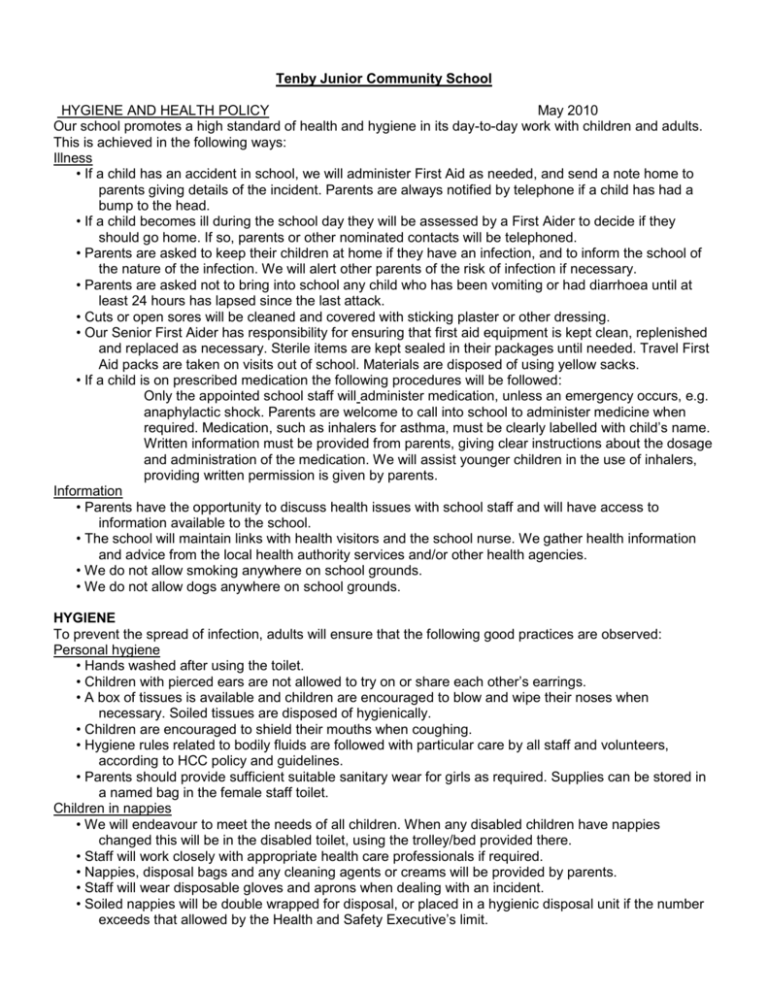
Tenby Junior Community School HYGIENE AND HEALTH POLICY May 2010 Our school promotes a high standard of health and hygiene in its day-to-day work with children and adults. This is achieved in the following ways: Illness • If a child has an accident in school, we will administer First Aid as needed, and send a note home to parents giving details of the incident. Parents are always notified by telephone if a child has had a bump to the head. • If a child becomes ill during the school day they will be assessed by a First Aider to decide if they should go home. If so, parents or other nominated contacts will be telephoned. • Parents are asked to keep their children at home if they have an infection, and to inform the school of the nature of the infection. We will alert other parents of the risk of infection if necessary. • Parents are asked not to bring into school any child who has been vomiting or had diarrhoea until at least 24 hours has lapsed since the last attack. • Cuts or open sores will be cleaned and covered with sticking plaster or other dressing. • Our Senior First Aider has responsibility for ensuring that first aid equipment is kept clean, replenished and replaced as necessary. Sterile items are kept sealed in their packages until needed. Travel First Aid packs are taken on visits out of school. Materials are disposed of using yellow sacks. • If a child is on prescribed medication the following procedures will be followed: Only the appointed school staff will administer medication, unless an emergency occurs, e.g. anaphylactic shock. Parents are welcome to call into school to administer medicine when required. Medication, such as inhalers for asthma, must be clearly labelled with child’s name. Written information must be provided from parents, giving clear instructions about the dosage and administration of the medication. We will assist younger children in the use of inhalers, providing written permission is given by parents. Information • Parents have the opportunity to discuss health issues with school staff and will have access to information available to the school. • The school will maintain links with health visitors and the school nurse. We gather health information and advice from the local health authority services and/or other health agencies. • We do not allow smoking anywhere on school grounds. • We do not allow dogs anywhere on school grounds. HYGIENE To prevent the spread of infection, adults will ensure that the following good practices are observed: Personal hygiene • Hands washed after using the toilet. • Children with pierced ears are not allowed to try on or share each other’s earrings. • A box of tissues is available and children are encouraged to blow and wipe their noses when necessary. Soiled tissues are disposed of hygienically. • Children are encouraged to shield their mouths when coughing. • Hygiene rules related to bodily fluids are followed with particular care by all staff and volunteers, according to HCC policy and guidelines. • Parents should provide sufficient suitable sanitary wear for girls as required. Supplies can be stored in a named bag in the female staff toilet. Children in nappies • We will endeavour to meet the needs of all children. When any disabled children have nappies changed this will be in the disabled toilet, using the trolley/bed provided there. • Staff will work closely with appropriate health care professionals if required. • Nappies, disposal bags and any cleaning agents or creams will be provided by parents. • Staff will wear disposable gloves and aprons when dealing with an incident. • Soiled nappies will be double wrapped for disposal, or placed in a hygienic disposal unit if the number exceeds that allowed by the Health and Safety Executive’s limit. • The changing area and bed will be cleaned after each use, and hands washed. • Staff will report any undue distress in a child, or other concerns, to the Designated Senior Person, according to school Child Protection procedures. Cleaning and clearing • Any spills of blood or vomit are wiped up and disposed of appropriately. Excrement will be flushed down the toilet. Disposable gloves are always used when cleaning up spills of body fluids. Floors and other affected surfaces are disinfected using chlorine or iodine bleach diluted according to the manufacturer’s instructions. Fabrics contaminated with body fluids are thoroughly washed in hot water. • Spare laundered pants, and other clothing, are available in case of accidents and polythene bags are available in which to wrap soiled garments. Children will be encouraged to change and clean themselves. • All surfaces are cleaned daily with an appropriate cleaner. Food The school will observe current legislation regarding food hygiene, registration and training. In particular, each adult will: • Always wash their hands under running water before handling food and after using the toilet. • Not be involved with the preparation of food if suffering from any infectious/contagious illness or skin trouble. • Never cough or sneeze over food. • Use different cleaning cloths for kitchen and toilet areas. • Prepare raw and cooked food in separate areas. • Keep food covered and either refrigerated or piping hot. • Ensure waste is disposed of properly and out of reach of the children. Keep a lid on the dustbin and wash hands after using it. • Wash fresh fruit and vegetables thoroughly before use. Any food or drink that requires heating will be heated immediately prior to serving and not left standing. No food or drink for children will be reheated. Tea towels will be kept clean and stored in a dust-free place, e.g. closed cupboard or drawer. Cracked or chipped crockery will not be used. Responsibilities of Pupils All pupils are expected to: 1. Exercise personal responsibility for the safety of themselves and their fellow pupils. 2. Wear school uniform, PE kit for sports and exercise, indoor footwear when in the school building, and appropriate footwear for outdoors. 3. The only earrings permitted in school are small stud earrings. Staff will only remove ear-rings for children in event of an injury. 4. Observe all the safety rules of the school and in particular the instructions of the teaching staff in the event of an emergency; 5. Use and not wilfully misuse, neglect or interfere with things provided safety purposes. The Governors and Headteacher will make pupils and parents aware of these responsibilities through direct instruction, notices and the school prospectus. This school policy on HYGIENE AND HEALTH was discussed by the School Council at their meeting on …………………………………………….. It was agreed to approve the policy. ……………………………………………. Signed by School Council Chairperson……………………………………………… Agreed by GB ………………………………………………
